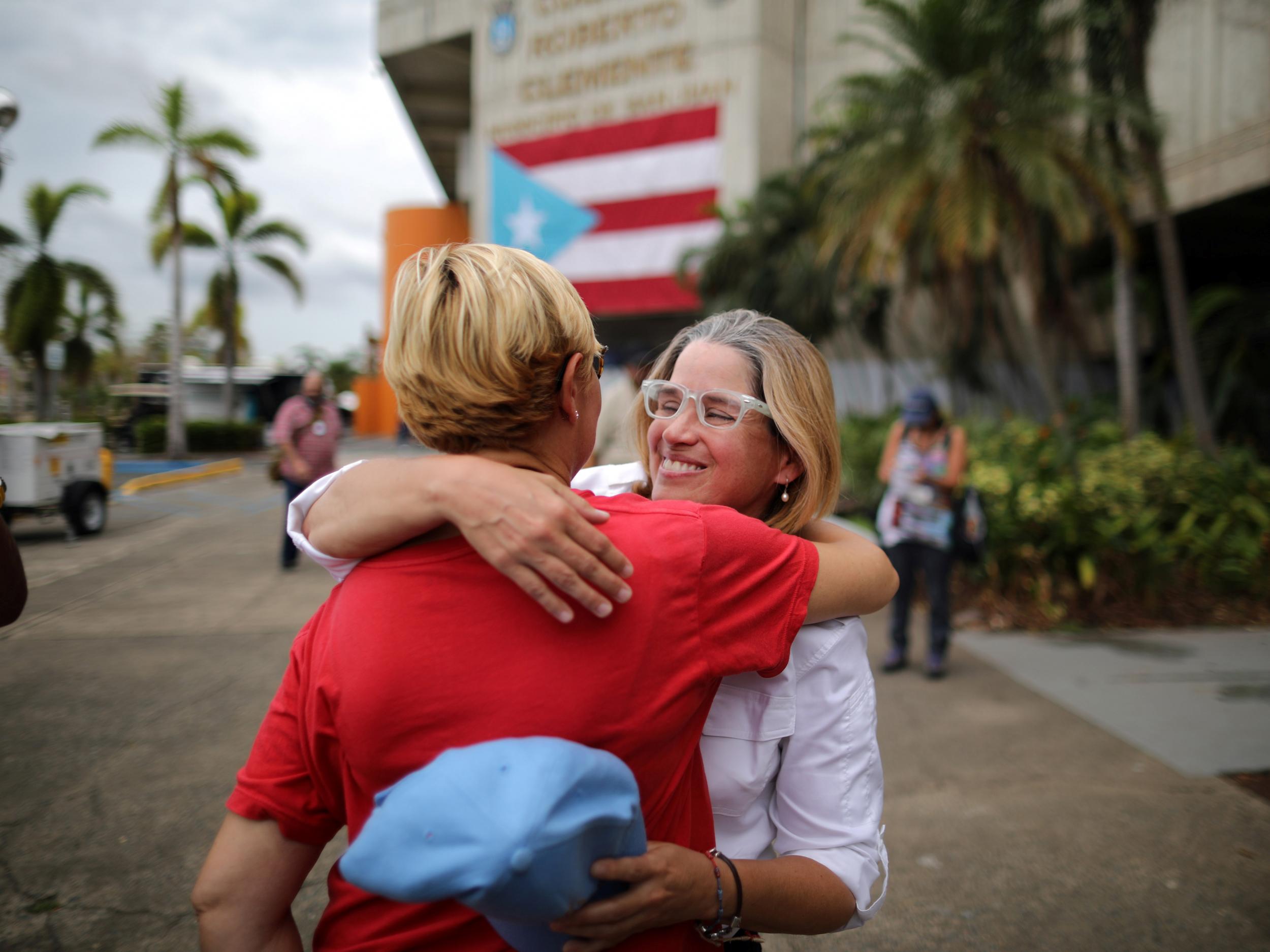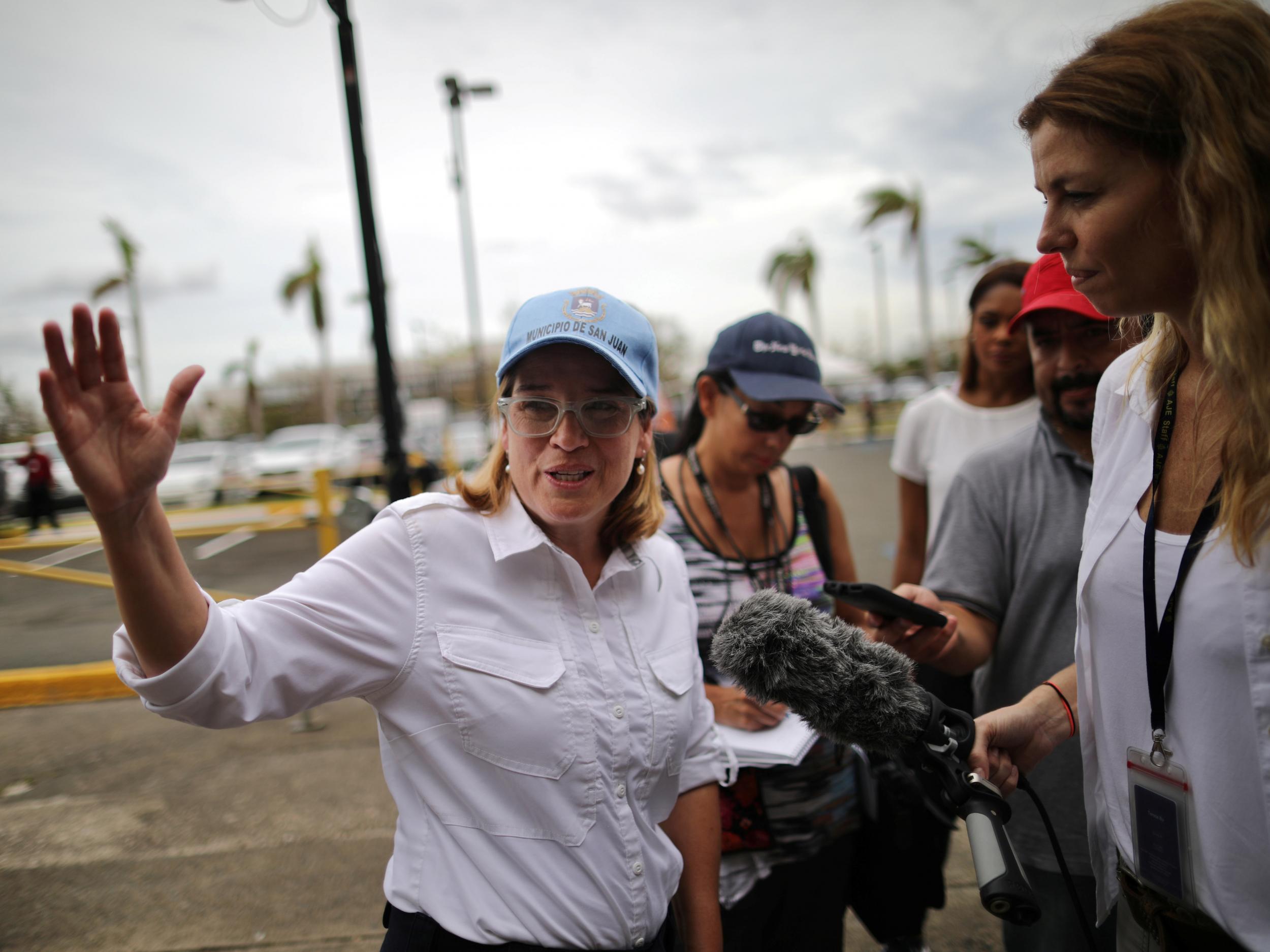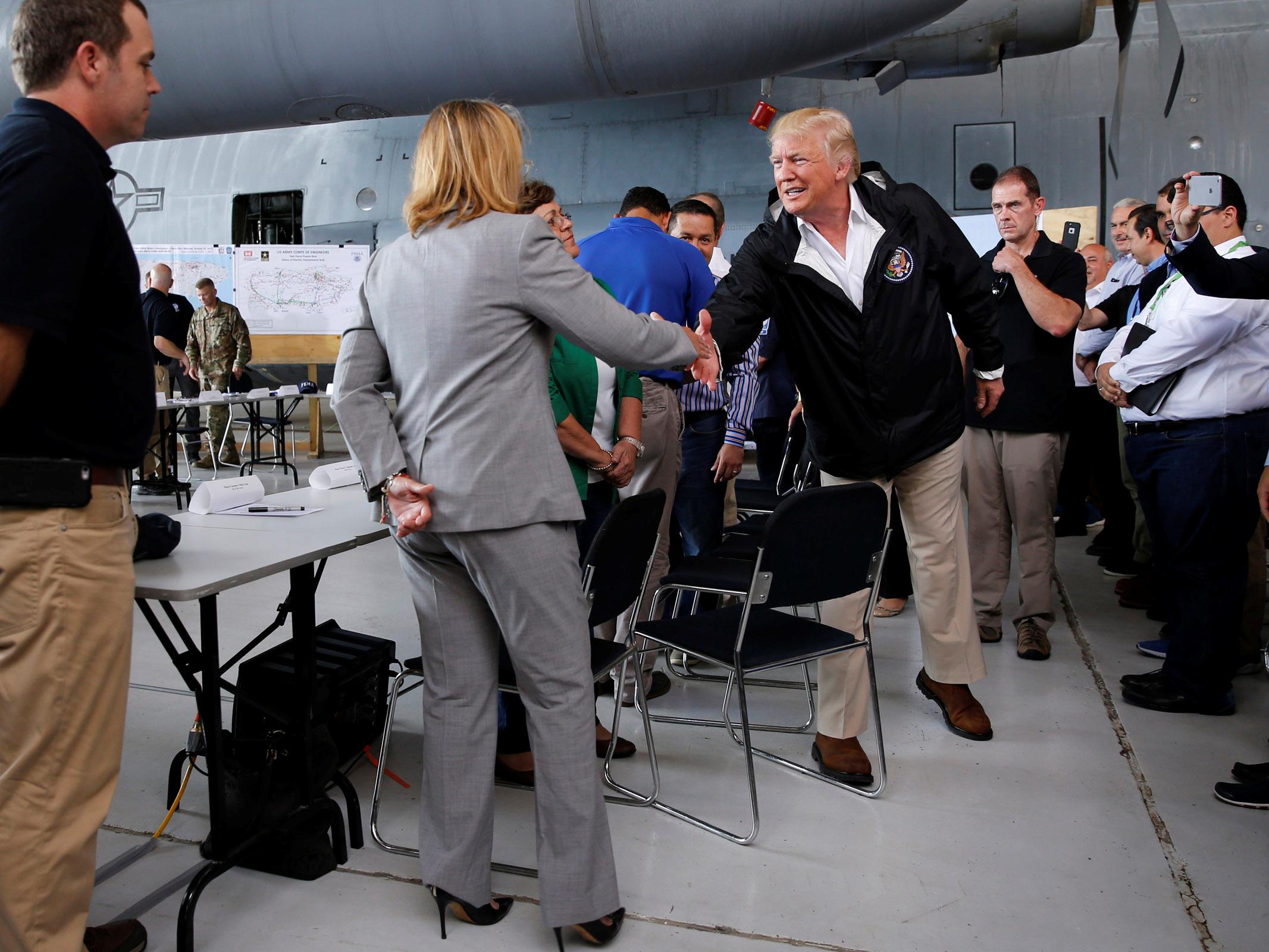Hurricane Maria: San Juan Mayor Carmen Yulin Cruz gives Donald Trump lesson in leadership after criticism
Politician spearheads Puerto Rico recovery effort after devastating tropical storm, comforting citizens, directing operations and shrugging off US President's attack with confidence and humour

Your support helps us to tell the story
From reproductive rights to climate change to Big Tech, The Independent is on the ground when the story is developing. Whether it's investigating the financials of Elon Musk's pro-Trump PAC or producing our latest documentary, 'The A Word', which shines a light on the American women fighting for reproductive rights, we know how important it is to parse out the facts from the messaging.
At such a critical moment in US history, we need reporters on the ground. Your donation allows us to keep sending journalists to speak to both sides of the story.
The Independent is trusted by Americans across the entire political spectrum. And unlike many other quality news outlets, we choose not to lock Americans out of our reporting and analysis with paywalls. We believe quality journalism should be available to everyone, paid for by those who can afford it.
Your support makes all the difference.When Hurricane Maria destroyed the infrastructure of Puerto Rico, it turned the mayor of its capital city into a spokeswoman for a stranded people.
Carmen Yulín Cruz Soto told the world of the “horror” she was seeing as whe waded through San Juan's flooded streets. And the desperation on an island that may remain without power for months.
Until then, Cruz had not been a well-known politician outside the island.But after Cruz criticised Washington's response to the hurricane this week - “save us from dying,” she pleaded on cable network - President Donald Trump took direct aim at her Twitter.
“Such poor leadership ability by the Mayor of San Juan,” he tweeted Saturday. The Democrats must have convinced her to say nasty things about him, he claimed.
Since the President brought it up, we present below the historical record of the leadership abilities of Cruz, before and after the storm.
Cruz has, in some ways, been a lifelong politician: Class president in eighth grade; student council president in high school.
Like many Puerto Ricans, she left the island to pursue opportunities on the US mainland, earning a bachelor's in political science at Boston University and a master's in public management and policy at Carnegie Mellon.
She stayed on the mainland for many years, according to her official biography, and worked her way up to the position of human resources director at several companies, including Scotiabank and the US Treasury Department.
In a 2014 interview with a small New York newspaper, Cruz described the tug of war she and other Puerto Ricans often feel between the mainland and their home island.
“I often say to my friends that I felt too Puerto Rican to live in the States; then I felt too American to live in Puerto Rico,” she said. “So when I settled back in Puerto Rico in 1992, I had to come to terms with all of that.”
After 12 years on the mainland, Cruz returned to her island to plunge back into politics.
She became an adviser to Sila Maria Calderon, then the mayor of San Juan who later became Puerto Rico's first and only female governor.
With the experience she gained under Calderon, Cruz ran in 2000 for a seat in Puerto Rico's House of Representatives. She lost that race, but in 2008 she ran again and won.
“Politics is a rough game, and sometimes as females we are taught that you have to play nice,” she said in a 2014 in an interview. “Sometimes you can't play nice.”
As the race for mayorship of her home town approached in 2012, she waffled publicly on whether to enter as a candidate.
At first she denied any plans to run. Once she entered the race, she strung together a series of small coalitions to form a base of support, including the LGBT community, students, Dominican immigrants and taxi drivers.
Such allies helped her defeat a formidable opponent - a three-time incumbent, Jorge Santini.

“People don't realise they have the power,” she recalled in an interview years later. “People don't realise that if they come together, there are more of them than those who occupy the seat that I'm in right now.”
Puerto Rico's politics are largely defined by their relationship with the mainland and whether the island should remain a US territory, gain statehood or vie for independence.
Cruz's party, the Popular Democratic Party, campaigns to maintain Puerto Rico's status quo as an unincorporated, self-governed US territory.
But in her trips to the United States since winning office, Cruz has at times advocated for more independence.
She once went before Congress to ask that Puerto Rico - crippled by debt - be able to reorganise under bankruptcy laws, and thereafter enter into commercial agreements with other countries.
“Puerto Rico has been denied these tools far too long,” Cruz said in 2015. “And as long as our options are defined by the powers of this Congress, we will always be at your mercy. The measure of our success will always be limited by the vastness of your control over our affairs.”
Two years later, Hurricane Maria has made the island's many dependencies all too apparent.
Hurricane Maria flooded roads, destroyed phone lines and cut the island's lifeline of goods from the mainland.
With limited communications and little help from the outside world in the first days after the hurricane, the mayors of Puerto Rico became the highest form of authority for many residents.
Cruz worked nearly nonstop on the ground - walking its streets and doing what she could for those she met. In an interview with a Washington Post reporter just three days after the storm, she described what she was seeing.
“There is horror in the streets,” she said at the time. “Sheer pain in people's eyes.”
The city's hospitals had no power. Much of the country would not have electricity until 2018, she said. Looters were already taking over some streets after dark. The few who still had gasoline and drinking water were quickly running out.
Cruz had written to scores of other mayors. “There's no answer,” she said. The mayor herself felt relatively helpless - only able to do so much for her exhausted neighbours and frightened constituents.
“I know we're not going to get to everybody in time,” she said. All she could do was try.
On her way to talk to the reporter, she said, a man had asked her for a favour: “To tell the world we're here.”
As tears filled her eyes, Cruz obliged. “If anyone can hear us,” she told the reporter: “Help.”
By Thursday night, families were searching for water by the light of dwindling cellphone batteries and moonlight. They passed through a tunnel beneath a city wall, and found at the exit a water tank left there by the city - a godsend.
And then they found their mayor.
Cruz hugged them as they came to her. She handed to each family a small solar-powered lantern - “a box of blessings,” she called it.
“Now this is life,” she told The Post.
Her people were resilient, she said. Residents had taken the streets back from criminal gangs.
But if the federal government didn't step up its response, she feared, “people will die.”
Nearly 5,000 National Guard personnel were stationed on the island before the storm, according to the White House, and the government has sent thousands more to help in the days since. But they have struggled to get even basics like drinking water to those in need.
A call with the White House earlier in this week had encouraged Cruz, she said. She told the federal government that 3,000 containers were sitting in a port, trapped behind electronic gates that wouldn't open. Since then, more federal personnel had arrived, and the government had sent pallets of water and food.
But her city was still on the brink, Cruz said.
On Thursday, in the White House driveway, acting Homeland Security Secretary Elaine Duke defended the Trump administration's response to the storm.
“It is really a good news story, in terms of our ability to reach people,” the director said.

When Cruz heard that, she made good on her warning years earlier - that sometimes in politics “you can't play nice.”
“People are dying in this country,” Cruz said at a news conference on Friday. “I am begging, begging anyone that can hear us, to save us from dying. If anybody out there is listening to us, we are dying, and you are killing us with the inefficiency and the bureaucracy.”
And with that, the mayor of a ruined city drew the attention and ire of the President of the United States.
“The Mayor of San Juan, who was very complimentary only a few days ago, has now been told by the Democrats that you must be nasty to Trump,” he wrote on Twitter.
The latter remark perplexed many experts on Puerto Rican politics.
“I don't know if Trump's comments shows an utter lack of understanding of the political situation in Puerto Rico, or if it's just a cover to rally his base,” said Yarimar Bonilla, an anthropologist at Rutgers University. “It makes no sense. Politics in Puerto Rico are completely different than the mainland, with completely different parties.”
Last year, Bonilla surveyed 1,000 residents of island. Most had no affiliation with Republicans or Democrats, and many had no little understanding of either party.
Cruz, who is widely expected to run for governor of the island, has some understanding, of course.
She isn't affiliated with either party, but has occasionally supported former Democratic President Barack Obama's policies. During the 2012 election, she met with Obama's campaign manager to push for healthcare funding and education grants for Puerto Ricans.
But that is a far cry from being a tool of the Democrats, said Amilcar Barreto, a Puerto Rican political expert at Northeastern University. “Complaining about people on the island not having food, electricity, water is not partisan. That's just basic human necessity.”
On Saturday, Cruz dismissed Trump's tweets with a smile. She was dressed in combat boots and cargo pants as she oversaw the distribution of supplies from San Juan.
“The most powerful man in the world is concerned with a five-foot-tall, 120-pound little mayor of the city of San Juan,” she said.
Suddenly, many others were concerned as well.
Cruz fielded calls all day long from US senators and business leaders. Reporters mobbed her for interviews.
And all day long, her criticism of the relief effort did not soften. “It's like a clogged artery,” she said of federal government's bureaucratic hurdles. “The heart has stopped beating.”
When asked if there was anything political in her barbed remarks, Cruz denied it.
“I don't have time for politics,” she said. “There is a mission, and that is to save lives.”
Then in the middle of an interview, the Mayor got a call about a generator catching fire at San Juan hospital. She quickly mobilised her staff, barking out orders like a general.
Then, within minutes, she was rushing once more out into her city.
The Washington Post
Join our commenting forum
Join thought-provoking conversations, follow other Independent readers and see their replies
Comments